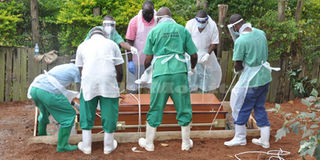Prime
How to handle remains of coronavirus victims

The casket containing the remains of former Monitor journalist Felix Basiime, who succumbed to Covid-19, is lowered into the grave in Kakooba, Mbarara South Division on June 19. PHOTO/ FELIX AINEBYOONA
What you need to know:
- Families and friends are no longer allowed to touch or view the remains of those who succumb to the disease.
The Covid-19 pandemic has altered the funeral routine across many cultures and religions in the country.
In many cultures, the death of a loved one is responded to by a huge turnout and gathering of mourners, cleaning of the body and gathering around it, as well as public viewing.
But as the country battles a resurgence of the virus, leading to many deaths, families and friends are no longer allowed to touch or view the remains of those who succumb to the disease.
This is due to the high transmission rates of the virus, through contact with the body or fluids. Thus special protocols have to be undertaken while handling the remains of victims to protect the public from infection.
According to guidelines by the World Health Organisation (WHO), although the likelihood of transmission while handling human remains is low, extreme caution is necessary. Teams handling the body must be trained to apply all infection prevention measures such as wearing protective equipment. The WHO recommends a body bag or coffin for transportation.
While appearing on NTV Uganda’s On the Spot talk show recently, the Minister of Health, Dr Jane Ruth Aceng, said fluids from the body could expose the handlers to infection.
The handling of those who succumb to the virus is now a preserve of trained personnel, private funeral services providers and government teams from each district. These are seen donning full body armour, including overalls, gumboots, masks and gloves.
Spraying of sanitiser in areas around the burial site is also common.
The Muslim way
Mr Musa Kibirango, the executive director of Muslim Funeral Services, said the handling of bodies of victims of Covid-19 requires training and precision.
“Our teams are always dressed in protective equipment such as overalls and gumboots to keep them from being exposed. On receiving the body, the burial team sanitises it and places it in a body bag or coffin. This is recommended for moving the remains from one place to another,” Mr Kibirango said.
According to Mr Kibirango, all their burials team have been vaccinated.
Mr Kibirango also explained how they have helped the Muslim community observe the Ministry of Health protocols while maintaining the burial requirements of Islam.
“We still maintain the Sharia manner even when one has died of Covid-19. We spray the body with a sanitiser that is not alcohol based. We spray the body first and if the death has occurred away from the hospital, we put the body in a body bag,” Mr Kibirango said.
He added: “After washing, we dress the body as per the religious requirements and then put the body in a bag. At the burial site, we remove the body bag and bury the body in clothes. After covering with some mud, the family is then allowed to access the burial site.”
Presidential directive
President Museveni, in his directives on containing the virus last month, said burials of people who succumb to Covid-19 are restricted to the core family.
He added that resident district commissioners and district police commanders should ensure that all SOPs are observed during burial and not more than 20 people should attend.
Government guidelines
1. Handling of bodies should be limited to a minimum of six persons
2. Surfaces or materials that come into contact with the body or materials from the body should be decontaminated with 0.1 per cent hypochlorite solution. If the surfaces are visibly soiled, they should be cleaned with soap and water, and then decontaminated with 0.1 per cent hypochlorite.
3. The body of the deceased must be wrapped in a waterproof bag before handing it over to relatives for burial. A close relative of the deceased should be available to verify the body before the bag is sealed.
4. Family members are advised not to touch the bodies of the deceased. Viewing of the body by family members and the public is prohibited. Family members should remain at least two metres from the body.
5. Burials should take place on the same day the death has occurred under the supervision of trained burial teams. An officer of the district Covid-19 taskforce should be present at the time of the burial to ensure compliance to SOPs.



